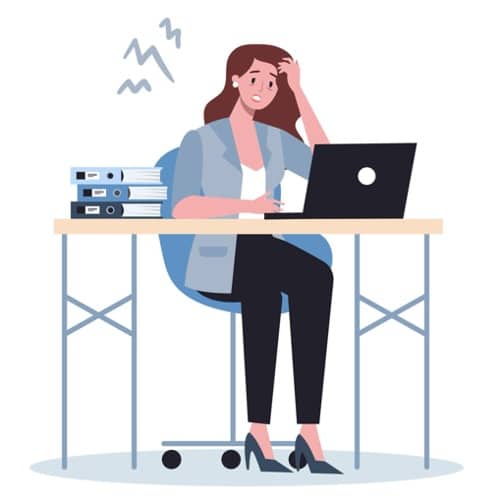The average American spends over seven hours on screens daily—almost 76 days a year. That much screen time can impact the quality of life. The National Library of Medicine reports that excessive screen time impacts children’s cognitive abilities and academic performance, and as we’ll discuss below, too much time online negatively affects adults, too.

That said, modern life runs on reliable, high-speed internet service, and screen time isn’t automatically bad. We use the internet for work, communication, education, and entertainment, all of which can be positive experiences. Balance is key. Knowing how to reduce screen time for adults and children helps us make healthy, mindful decisions in today’s digital age.
Contents
Understanding the Impact of Screen Time
The Effects of Excessive Screen Use
Excessive screen time has physical and mental effects, including:
- Obesity: Screen time is typically a sedentary activity. Too much time playing video games, scrolling social media, or sitting in front of a work monitor increases the risk of obesity, which leads to a higher risk of heart disease, diabetes, increased blood pressure, and high cholesterol.
- Sleep Problems: LED screens emit blue light, which triggers the release of the hormone cortisol. Cortisol encourages alertness and inhibits melatonin production, a hormone the brain releases in response to darkness that promotes sleep. Too much screen time before bed can make sleeping difficult, especially if you reach for your phone when you can’t settle at night.
- Neck and Back Pain: Excessive screen time, especially when using phones or tablets, can lead to bad posture and chronic back, shoulder, and neck pain.
- Eye Strain: Focusing on close-up screens for long periods can lead to dry eyes, eye fatigue, and headaches.
- Depression and Anxiety: Too much screen time is linked to depression, anxiety, and suicidal behavior, especially in teenagers who spend five or more hours a day on devices.
- Learning Difficulties: Children who use electronic screens for two or more hours daily score lower on thinking and language tests.
- Brain Structure Changes: Excessive screen time thins the brain’s cortex in children. The cortex is essential for critical thinking and reasoning.
- Social Isolation: Excessive screen time can result in fewer face-to-face interactions and increased feelings of isolation and loneliness.
- Attention Problems: Screen time provides a steady stream of stimulation, which can impair concentration and focus during complex tasks.
Why Mindfulness Matters
Mindfulness helps people balance their screen time with real-life interactions and activities. At its most basic, digital mindfulness is the habit of remaining aware of our online actions to enjoy the benefits of devices without the negative consequences of excessive use. Staying mindful improves focus, sleep patterns, and overall well-being. Here’s how to reduce screen time with some simple mindfulness tips:
10 Tips for Balancing Screen Time and Mindfulness
Set Clear Screen Time Limits
Screen time limits are often set for children but also benefit adults. Go into your device settings and look for the “Screen Time” or “Digital Wellbeing” options. Within these settings, you can set daily time allowances for every app you use.
If you’re restricting your screen time, high-speed internet helps you get the most out of the time you have. Use an internet speed test to see if you need better service.
Create Tech-Free Zones
“Tech-free” zones are spaces where any use of electronic devices, including phones, is forbidden. Consider making your dining area tech-free to encourage face-to-face conversation. Making the bedroom tech-free encourages sleep instead of late-night screen time.
Establish a Digital Detox Routine
A digital detox is a set time when you avoid all screen time and give yourself a break from the constant stream of stimulation provided by electronic devices. It’s an opportunity to reduce stress, strengthen social relationships, and reconnect with the non-digital world. Schedule a day without screens once a week or a weekend without devices once or twice a month.
Practice Mindful Technology Use
Stay mindful when you use technology. Watch for signs you’re aimlessly scrolling rather than using technology for a purpose.
Use Technology for Mindfulness
Meditation apps, time management apps, and nature sound playlists can all help you stay in the moment and improve mindfulness, giving you more conscious control over your screen time.
Incorporate Breaks During Screen Time
If you cannot avoid large amounts of screen time, such as when you’re working, incorporate regular breaks into your day. Get up and stretch every 20 minutes. If screen time causes eye fatigue, use lubricating eye drops during breaks. You can also follow the 20-20-20 rule: Look at something 20 feet away every 20 minutes for 20 seconds.
Prioritize Offline Activities
Give priority to hobbies, exercise, and outdoor activities that don’t depend on screens. Getting outside and away from electronic devices is especially helpful—there’s a reason the term “touch grass” became popular.
Schedule Mindfulness Practices
Set aside time for meditation, journaling, or deep breathing exercises. When performed consistently, these activities can positively impact mental well-being and mindfulness.
Maintain a Consistent Sleep Schedule
Proper “sleep hygiene” helps you get the rest you need. Avoid screens for an hour before bedtime, and resist the urge to pick up your phone if you can’t sleep. A relaxing bedtime routine encourages restful sleep.
Encourage Family or Group Efforts
Get everyone in the household involved in your screen management goals. Children whose parents practice healthy screen habits are more likely to abide by screen time restrictions. Find alternatives to device use, like family outings or game nights, and hold each other mutually accountable for reaching mindfulness goals.
Overcoming Common Challenges
Life is complex and will throw obstacles in your journey toward a more mindful relationship with your devices. Use the advice above, and stay consistent. You may have days when you make a misstep and spend too much time on social media (let’s face it, a social media feed is incredibly addictive). When this happens, accept it and resume your mindfulness practices. With time, you’ll find it’s easier to stick with your screen time restrictions.

Long-Term Benefits of Balancing Screen Time and Mindfulness
Many people see benefits to mindfulness within a few days of working on reducing screen time. Necks ache a little less, eyes are no longer as dry, and the rate of face-to-face interactions increases. As time passes, mindfulness produces even more benefits, including:
- Improved mental clarity
- Better relationships
- Greater productivity
- Enhanced focus
- Reduced stress
- Improved sleep
- Relief from chronic neck pain
- Increased self-awareness
Moving Forward
Knowing how to reduce screen time using mindfulness leads to healthier, more productive, and, frankly, more enjoyable lives. As we said before, the key is balance. You don’t need to avoid your favorite video game or uninstall your social media apps. Instead, you’re working towards a healthier approach to life while remembering to take breaks from the bustle and distractions of the online world.
What steps do you take to balance screen time with mindfulness? We’d love to hear your success stories and strategies!

